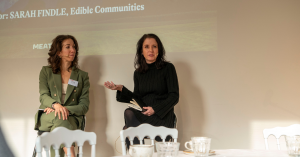This Earth Day, Meatable Joins Forces with Global Changemakers to Help Build a More Sustainable Food Future
Meatable is dedicated to supporting three mission-driven organizations: Food Tank, The United Nations Global Compact, and The Hunger Project.
LEIDEN, NETHERLANDS, April 22, 2025 /EINPresswire.com/ -- In recognition of Earth Day 2025, Meatable, a leader in cultivated meat technology, is proud to announce its support of three mission-driven organizations: Food Tank, The United Nations Global Compact, and The Hunger Project. This commitment is part of Meatable’s broader effort to drive real, positive change in how the world produces and consumes food.
With the global population projected to surpass 10 billion by 2050, the urgency to develop sustainable food systems has never been greater. The demand for protein continues to grow, but traditional livestock farming requires vast amounts of land, water and energy, contributing significantly to greenhouse gas emissions and deforestation. If we continue down this path, feeding the world will come at an unbearable environmental cost. Cultivated meat can be part of the solution, offering a way to produce real meat with a fraction of the negative impact. But much more work is needed to preserve our planet for future generations.
“As a company dedicated to transforming the global food system, we recognize that real progress requires collaboration, not competition,” said Jeff Tripician, CEO of Meatable. “By supporting these respected organizations, we’re not only showing our commitment to impact—we’re investing in a shared vision of a food system that feeds everyone, fairly and sustainably.”
Food Tank bridges domestic and global food issues and highlights how hunger, malnutrition, the climate crisis and other problems can be solved by more research and investment in sustainable agriculture and food systems. They focus on initiatives already at work that need more attention, more research and ultimately more funding to be replicated and scaled.
The organization’s co-founder Danielle Nierenberg recently spoke at an event hosted by Meatable and shared: “In my world, for so long when you looked at the sustainable agriculture movement, technology was a bad word, and I think that’s really changing. We’re seeing this thread that innovation and technology can be a big part of the solution, not the only solution. We don’t want tech to solve everything because it can’t, but it can certainly be an ingredient in creating a more sustainable, equitable, just and fair food system.”
Meatable agrees, and hopes to be one ingredient in that solution. The company recently joined the United Nations Global Compact, which calls companies to align strategies and operations with universal principles on environment, human rights and labor and actively contribute to advancing the Sustainable Development Goals.
At a more grassroots level, Meatable is also supporting The Hunger Project, a global nonprofit committed to ending world hunger by partnering with communities to achieve their own visions of a sustainable future free from hunger and poverty. They focus on building self-reliance at the grassroots level, working with women as key change agents and forming effective partnerships with local governments to create a lasting impact.
Meatable’s Earth Day commitments reflect more than a gesture—they underscore the company’s belief that lasting impact requires collective action, global collaboration across industries, including the meat industry, and continued innovation.
To learn more about Earth Day and how to get involved, visit www.earthday.org. For more on Meatable’s mission and technology, visit www.meatable.com.
Meatable is leading the charge in revolutionizing how the meat industry sources and produces meat. It operates as a vendor-partner to the meat industry and provides the science and technology to sustainably produce affordable, great-tasting, real meat at scale. Meatable’s cultivated meat technology is designed to complement and integrate into the existing traditional meat industry’s supply chains, offering opportunities for partnerships that strengthen the entire system. Meatable aims to satisfy the world’s appetite for meat without harming animals, people or the environment
Marketing
Meatable
+31 6 30831388
email us here
Visit us on social media:
LinkedIn
Facebook
Instagram
Legal Disclaimer:
EIN Presswire provides this news content "as is" without warranty of any kind. We do not accept any responsibility or liability for the accuracy, content, images, videos, licenses, completeness, legality, or reliability of the information contained in this article. If you have any complaints or copyright issues related to this article, kindly contact the author above.
Posture Pandemic Declared as 1 in 3 Australians Now Suffer Chronic Neck Pain, Reports North Shore Family Chiropractors
Amiko Sees a Stunning Run for 10 Consecutive Weeks at #1 on radio.fm100 in Brazil with her Breakout Hit, “Signs of Life"
Renowned Military Defense Lawyer Michael Waddington Releases New Edition of Acclaimed Book “The Art of Trial Warfare”
Kalendarium
Więcej ważnych informacji
 Jedynka Newserii
Jedynka Newserii

 Jedynka Newserii
Jedynka Newserii

Prawo

KE proponuje nowy Fundusz Konkurencyjności. Ma pobudzić inwestycje w strategiczne dla Europy technologie
W środę 16 lipca Komisja Europejska przedstawiła projekt budżetu na lata 2028–2034. Jedna z propozycji zakłada utworzenie Europejskiego Funduszu Konkurencyjności o wartości ponad 400 mld euro, który ma pobudzić inwestycje w technologie strategiczne dla jednolitego rynku. Wśród wspieranych obszarów znalazła się obronność i przestrzeń kosmiczna. Na ten cel ma trafić ponad 130 mld euro, pięciokrotnie więcej niż do tej pory.
Firma
Były prezes PGE: OZE potrzebuje wsparcia magazynów energii. To temat traktowany po macoszemu

Choć udział odnawialnych źródeł energii w miksie energetycznym Polski jest stosunkowo wysoki i rośnie, to ten przyrost jest chaotyczny i nierównomiernie rozłożony miedzy technologiami – wskazuje Forum Energii. Dodatkowo OZE potrzebują wsparcia magazynów energii, a zdaniem Wojciecha Dąbrowskiego, prezesa Fundacji SET, ten temat jest traktowany po macoszemu. Brak magazynów powoduje, że produkcja energii z OZE jest tymczasowo wyłączana, co oznacza marnowanie potencjału tych źródeł.
Infrastruktura
Wzrost wynagrodzeń ekip budowlanych najmocniej wpływa na koszty budowy domu. Zainteresowanie inwestorów mimo to nieznacznie wzrasta

Budowa metra kwadratowego domu w Polsce kosztuje od 5,55 do 6 tys. zł w zależności od województwa – wynika z najnowszych analiz firmy Sekocenbud. Najdrożej jest w Warszawie, gdzie cena za metr kwadratowy domu przekroczyła już 6,2 tys. zł. Na przyrosty kosztów budowy domu wpływają zarówno drożejące materiały budowlane, jak i wyższe wynagrodzenia pracowników. Inwestorzy nie rezygnują jednak z budowy domów jednorodzinnych, co ma związek m.in. z wciąż wysokimi cenami mieszkań czy też obniżką stóp procentowych.
Partner serwisu
Szkolenia

Akademia Newserii
Akademia Newserii to projekt, w ramach którego najlepsi polscy dziennikarze biznesowi, giełdowi oraz lifestylowi, a także szkoleniowcy z wieloletnim doświadczeniem dzielą się swoją wiedzą nt. pracy z mediami.










.gif)

 |
| |
| |
|